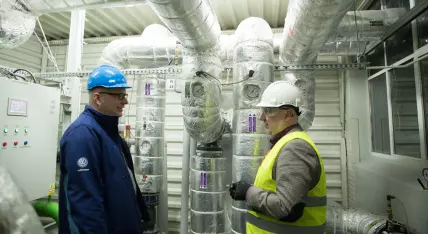The challenge of ecological transformation requires us to reinvent the way we use and produce energy. Among the under-exploited resources, "waste heat", an inherently renewable energy, is emerging as a promising solution.
Little known to the general public, this form of energy holds considerable potential for limiting greenhouse gas emissions and promoting energy sobriety.
the date by which Veolia will make all its services energy self-sufficient in France, thanks in particular to waste heat recovery.
The recovery of waste heat represents a major step forward in the quest for sustainable solutions to energy and climate challenges. By harnessing this untapped resource, we can make a significant contribution to ecological transformation while creating new economic opportunities. It is vital to raise public awareness of this promising solution and encourage its wider adoption.
Unfortunately, waste heat is a common practice in many industries. Factories, power stations and many other facilities often produce more heat than they use. This excess heat, if recovered and reused, could make a significant contribution to reducing our carbon footprint.
Definition: What is waste heat ?
Waste heat refers to the excess heat produced during various industrial or energy production processes, and which is generally rejected into the environment without being used. This unused energy represents a considerable opportunity, both economically and environmentally.
Waste heat recovery: a crucial lever
Recovering waste heat involves capturing this excess energy and reintegrating it into a productive process. This can be done at several levels: within the industrial facility itself, or by redistributing it to external users via a heat network.

The impact of waste heat recovery
1. Reducing CO2 emissions
By reusing this surplus heat, we reduce our dependence on fossil fuels. This reduces greenhouse gas emissions, helping to mitigate climate change.
2. Promoting Energy Sobriety
Recovering waste heat is part of a strategy of energy sobriety. Rather than producing more, the aim is to optimize the use of resources that are already available, thus promoting more responsible and sustainable energy management.
3. Creating new economic opportunities
The implementation of waste heat recovery systems can generate new economic activities, particularly in the fields of engineering, construction and operation of recovery facilities.
Veolia, an exemplary company:
Several initiatives have already been implemented to exploit waste heat.
Focus: the exemplary waste heat recovery project in Poznań, Poland
In Poznań, Poland, Veolia has set up an innovative energy loop that perfectly illustrates the recovery of waste heat. This initiative contributes to heating the city's buildings, benefiting local residents.
The Volkswagen plant is the largest cylinder head factory in Europe, producing 4.5 million parts annually and requiring 30,000 tonnes of aluminium.
In collaboration with Volkswagen, Veolia developed a heat recovery system for the air compressors in 2016. This heat is then re-injected into the district heating network of the city of Poznań.
The results are remarkable:
- Supplying zero-emission heat to 6,500 apartments and 60 public buildings (70,000 GJ/year of recovered waste heat).
- CO2 emissions reduced by almost 3,500 tonnes/year.
- Annual savings of 4,000 tonnes of coal and 17 million liters of water in the cooling process.
Estelle Brachlianoff, CEO of Veolia, shares an enlightening perspective on waste heat recovery. For her, "sufficiency" is the key. This vision is perfectly embodied in Veolia's commitments, including the ambitious project to make all Veolia services energy self-sufficient by 2027 in France, thanks in particular to the recovery of waste heat.

The recovery of waste heat represents a significant step forward in the quest for sustainable solutions and renewable energy production to meet energy and climate challenges. By harnessing this resource, we can make a considerable contribution to the ecological transition while creating new economic opportunities. It is imperative to raise public awareness of this promising solution and encourage its widespread adoption. Often overlooked, waste heat could well be one of the pillars of our planet's sustainable energy future.


